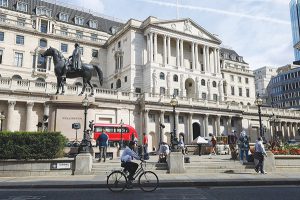Bloomberg
Governor Andrew Bailey put the Bank of England’s BOE) credibility on the line with a pledge to end emergency gilt purchases as scheduled on Friday, in the face of mounting market pressure to extend the program.
Investors dumped UK assets after Bailey told pension funds they have just “three days left†to sort out their liquidity positions before the bond-buying will be halted. Sterling dropped below $1.10 for the first time since September 29 and even US stocks fell following his remarks.
The UK currency recouped some of those losses in Asian trading after the Financial Times reported the BOE had signalled to bankers it could extend the program past deadline, though it was unclear from the report when that guidance was given.
The BOE started buying long-dated bonds late last month as an emergency measure to ensure pension funds exposed to so-called liability-driven investment strategies could clear their positions after the British government triggered a market rout by announcing £45 billion ($50 billion) of unfunded tax cuts. The plan was always due to expire at the end of this week and Bailey signaled he wants to stick to that timetable to enforce market discipline despite traders and asset managers pricing in longer term support.
The central bank has already seen its credibility called into question after a lackluster initial response to rocketing inflation and now Bailey finds himself boxed in: If he holds the line the UK could see another punishing surge in bond yields that would cause more economic damage; if he backs down, his reputation will be in tatters.
The gamble that Bailey has taken on gives a sense of how uncomfortable he is buying gilts to ensure financial stability at a time when he’s also trying to tighten monetary policy to tackle surging inflation.
Addressing Institute of International Finance annual meeting in Washington, Bailey made it clear the policy had been a last resort. Officials stayed up several nights trying to construct an alternative “targeted†intervention, he said, but they were left with no option other than purchasing government debt.
Unlike the ‘dash for cash’ when the bank bought bonds at start of pandemic in March 2020, the policy is internally contradictory: Bailey is hitting the accelerator and the brake at the same time — buying gilts for financial stability while raising interest rates and preparing to sell gilts to bring down inflation.
The fundamental cause of Bailey’s problem is the new British government led by Liz Truss which took office at the start of September with an ideological commitment to cutting taxes. They have disregarded the advice of the economic-policy establishment that she and her chancellor, Kwasi Kwarteng, say have held back growth with their risk-averse policy settings.
While Truss’s initial policy push was delayed by the death of Queen Elizabeth II, she stamped her mark on the UK on September 23, when Kwarteng unveiled tax-cutting plans. Bailey has been dealing with the fallout ever since, as markets tumbled, pushing up borrowing costs for millions of mortgage holders and threatening to
trigger a fire sale of UK assets.
Investors fear that the UK will let both inflation and debt spiral upwards with the BOE unwilling to offset the government’s inflationary tax cuts by raising rates aggressively.
The government may may have to step in to rescue stricken pension funds itself. Nick Macpherson, a former Treasury official, said on Twitter: “It is not the Bank of England’s job to bail out pension funds. But history suggests it’s a job the government will take on and it will be working on a scheme right now. Sadly, this can only add to the state’s liabilities and to upward pressure on interest rates.â€
Kwarteng will join Bailey at the International Monetary Fund meetings in the US capital this week in an awkward double act trying to defend the UK policy settings against the backdrop of turmoil at home. The IMF has been among the most prominent critics of Kwarteng’s fiscal policy.
The BOE fears its emergency gilt purchases grounds could look like it is bankrolling the government. Anne Sibert, professor of economics at the University of London, described the bank’s position as “outrageous†and said a proper intervention in gilt markets for financial stability reasons “should long ago have been formalized.â€
Bailey signalled that the BOE is worried that an extended bail-out with no regulatory strings attached will create “moral hazard,†under which institutions are encouraged to take risky bets because they know they will always be rescued. At the IIF, he pointed out that the non-bank sector, the collection of asset managers and pension funds at the heart of the market chaos, is not sufficiently regulated.
Bartosz Pawlowski, chief investment officer at mBank SA’s asset management operation who watched Bailey at the IIF, said he thought the central banker must have had an indication from the pension fund industry that they could contain their risks within the deadline he’s set.
“I would assume he is aware of what is happening with pension funds and expects the process to be finished by the end of the week,†he said. “Why else would you put yourself in a position like this?â€
 The Gulf Time Newspaper One of the finest business newspapers in the UAE brought to you by our professional writers and editors.
The Gulf Time Newspaper One of the finest business newspapers in the UAE brought to you by our professional writers and editors.
